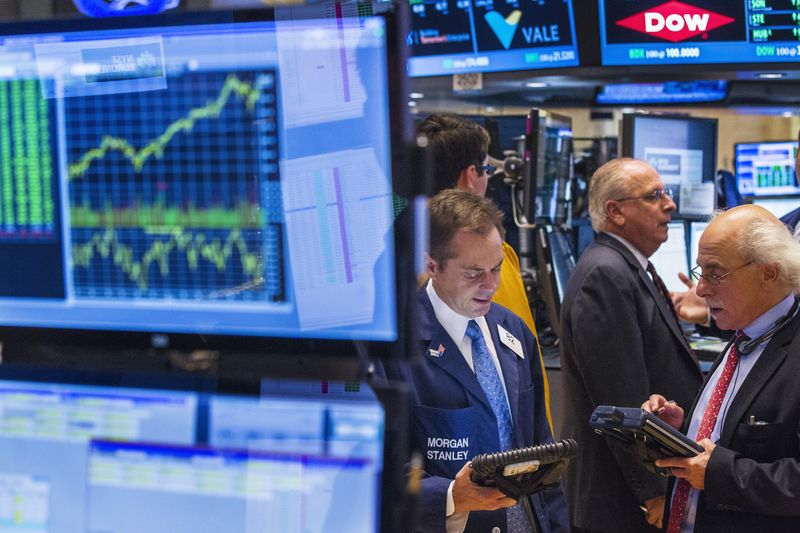US stock futures inch lower after Wall St marks fresh records on tech gains
Investing.com--The S&P 500 closed lower Tuesday, retreating from record levels after big tech started the third quarter on the back foot as investors weighed up updates on trade and fiscal policy as well as a rise in Treasury yields.
At 4:00 p.m. ET (20:00 GMT), the Dow Jones Industrial Average gained 400 points, or 0.9%, the S&P 500 index fell 0.1%, and the NASDAQ Composite dropped 0.8%.
The S&P 500 and the NASDAQ Composite both recorded fresh closing peaks on Monday, with sentiment boosted by signs of easing trade tensions as well as expectations of Fed rate cuts in the near future.
Trade deals in focus
The announcement of a trade agreement between the U.S. and China last week, coupled with Canada withdrawing its digital services tax on tech companies just hours before it was set to be implemented, have bolstered expectations that trade agreements could be reached before President Trump’s July 9 deadline.
However, a deal with Japan is proving troublesome, and U.S. trade officials under Trump are now pivoting to narrower trade agreements in a bid to secure quick wins ahead of a July 9 deadline, when steep reciprocal tariffs are set to return, the Financial Times reported on Tuesday, citing people familiar with the talks.
The administration is seeking “agreements in principle” on limited issues with select countries to avoid the reimposition of tariffs as high as 50%, the FT report stated.
These phased deals mark a retreat from Trump’s original pledge to strike 90 comprehensive trade agreements during a 90-day pause in tariff enforcement, which began on April 2.
While such agreements may spare countries from the harshest levies, a 10% baseline tariff would remain in place as negotiations on broader issues continue.
However, talks remain complicated, and alongside the narrower deal approach, the administration is still considering tariffs on key sectors, the FT reported.
Trump attacks Powell, again
Rising expectations of a Federal Reserve rate cut this year, spurred by last week’s weaker-than-expected inflation data, have further supported stock markets.
The U.S. central bank decided to leave rates at a target range of 4.25% to 4.5% after a two-day meeting last month, with Fed Chair Jerome Powell backing a wait-and-see attitude to future policy actions as a prudent approach during a time of uncertainty around the impact of Trump’s aggressive tariff agenda on the wider economy.
This cautious stance has annoyed President Trump, who stepped up his attacks on Powell on Monday, sending the central bank leader a note criticizing him for being "as usual, too late" on cutting interest rates.
In a handwritten letter that came with a list of policy rates from central banks around the world, Trump urged Powell to lower borrowing costs by "a lot," arguing that "hundreds of billions" of dollars are "being lost."
Trump added in a social media post displaying the letter that the U.S. should be paying "1% interest or better."
The U.S. president is reportedly mulling over naming a potential successor to Powell later this year. Such a move could create a so-called "shadow" Fed chair which may diminish Powell’s ability to sway policy decisions, analysts have suggested.
Markets now see a more than 90% chance of a Fed rate cut in September, and economic data due this week--Thursday’s monthly official jobs report in particular-- could move these odds.
Ahead of that, investors will be studying job openings data and manufacturing PMI numbers.
Senate Republicans try to pass Trump’s tax cut bill
The Senate on Saturday narrowly approved a 51–49 procedural vote to open debate on President Trump’s comprehensive “One Big Beautiful Bill,” combining tax cuts, domestic spending changes, and border security provisions.
According to a new Congressional Budget Office (CBO) estimate released Sunday, the Senate’s version of the bill would add approximately $3.3 trillion to the federal deficit over the next decade.
Senate Republicans were aiming to wrap up the process before the July 4 holiday.
The Republican bill proposes a $5 trillion debt ceiling increase, $1 trillion more than the House version, but failure to pass it could push the Treasury toward a summer deadline and possible default.
Tesla slumps on Trump/Musk spat
In the corporate sector, Tesla’s (NASDAQ:TSLA) shares fell sharply after President Trump escalated his feud with Elon Musk, accusing the Tesla CEO of benefiting excessively from government subsidies and calling for a review of his company’s federal support.
In a post on Truth Social, Trump suggested that the Department of Government Efficiency (DOGE) should examine Tesla’s federal support, warning that “Elon may get more subsidy than any human being in history”.
"Without subsidies, Elon would probably have to close up shop and head back home to South Africa," Trump added.
Trump’s ire towards Musk stems largely from the Tesla CEO’s criticism of a sweeping tax and spending cut bill backed by Trump, which is currently making its way through the Senate.
Elsewhere, Hasbro Inc (NASDAQ:HAS) surged to a fresh record high after Goldman Sachs upgraded its rating on the company to buy from neutral amid expectations that the company’s new Magic: The Gathering trading cards could help drive sales.
Peter Nurse, Ayushman Ojha contributed to this article
